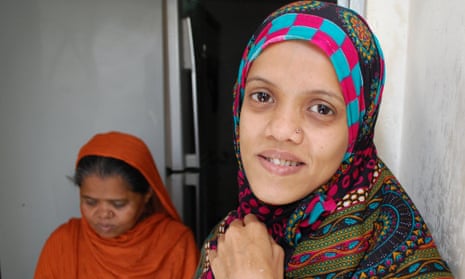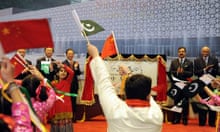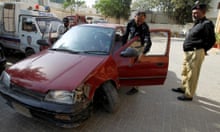In the dense alleyways of Ittehad town on the outskirts of Karachi, the fastest growing city in Pakistan, Farhina Tousif is waging a losing battle with a mother over vaccinating her children against polio.
“Do you have any children in this household under the age of five?” Tousif calls through a curtain separating the male and female quarters of a conservative Pashtun family. “No,” comes the answer via a nine-year-old boy, who is translating between the national language, Urdu, and the woman’s native Pashtu.
“Sister, I know you have children because I can see your son there. For God’s sake, don’t be the enemy of your child – let me vaccinate him,” says Tousif. The answer from behind the curtain is still a firm no.
Tousif knows when she has lost, and moves swiftly on to the next house. But the unvaccinated child or children left behind are not the only ones at risk in a complicated and patchy effort to control the number of wild poliovirus cases found in Pakistan, which shot up from 58 in 2012 to 306 last year.
Since the Taliban issued a ban on vaccinations, and compared female health workers to prostitutes for working outside the home, more than 80 vaccinators and the armed guards assigned to protect them have been gunned down.
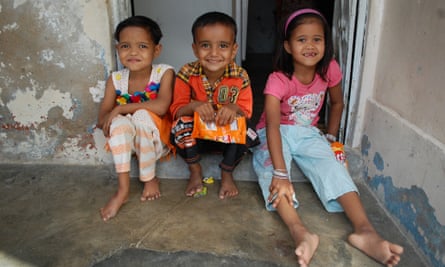
Tousif and others like her on the frontline of a battle to contain the disease have found their efforts entangled with women’s right to work, claims of US espionage, a barely adequate healthcare system and a deep distrust of authority. The challenges sometimes feel insurmountable, Tousif says.
“My colleagues risk their lives trying to help people, and get paid 500 rupees [£3.30] a day. I have to encourage them, like I do the mothers I see, to go out and work each time. It’s not the money, it’s the fact they don’t feel like we’re winning the war on polio. And when one of us dies, the number of vaccinators falls for months. But we need the money, so they usually come back.”
The Pakistani branch of the Taliban, the TTP, has seized on evidence that the vaccination campaign was used as cover by the CIA to gather intelligence. The US government said last year that the practice had stopped and the CIA director had instructed the agency “to make no operational use of vaccination programmes, which include vaccination workers”.
But rumours spread fast in Pakistan and prove near-impossible to debunk once they have taken hold. Communities such as the Pushtuns now associate polio vaccinators with CIA spies and US drones.
Added to this are the problems of keeping track of the million or so people internally displaced from places such as Waziristan because of the US drone-strike campaign, an under-resourced healthcare system and a lacklustre campaign against what the World Health Organisation has called a “public health emergency of international concern”.
It is easy to see why Tousif is frustrated. In the face of lethal risks, she attempts to charm, coax or even force mothers to give the two drops of polio vaccine to their children. She has heard all the excuses: the medicine doesn’t work, it’s un-Islamic, you work for the Americans, we don’t trust you.
In Ittehad, she and her team of female health workers have half a day to vaccinate 20,000 children in a neighbourhood in which poor sanitation and overcrowding provide fertile ground for the virus. The previous week, a bomb was found attached to a rickshaw close to a hotel where some health workers were staying.
Even under these harsh conditions, for Tousif and her colleagues it is either this or no work at all. Polio vaccination is one of a handful of jobs seen as acceptable for Muslim women. Tousif’s earnings help with the rent on the one-bedroom flat she shares with her mechanic husband and three children, and with school fees.
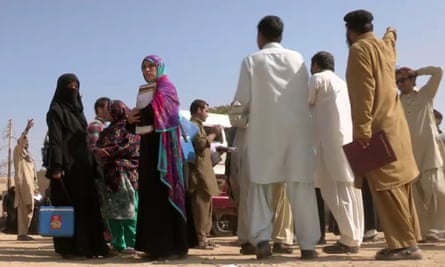
Her commitment to ending polio in Pakistan, one of handful of countries in the world where wild poliovirus can be found, is unwavering. But so is the opposition to the vaccination campaign.
It is hard to convince Pakistani mothers to give their children the polio vaccine if root causes of the disease’s spread, such as dirty water and open sewers, remain so badly managed.
“All the millions they spend coming here every week banging on our doors and giving the drops is a waste and doesn’t work,” said one mother, echoing the views of others. “My kids play outside where there are open sewers and dirt water. All this money – why can’t they clean the sewers with it? Why don’t they help me send my children to school? Why doesn’t the government spend the money on that?”
In a report last October, the Independent Monitoring Board for polio described the Pakistani vaccination campaign as a “disaster” – although money and resources since pumped into the campaign by the UN children’s agency, Unicef, and the WHO have led to a fall in the numbers infected.
Tousif is undeterred. “One day, when Pakistan is finally polio free, I can tell my kids that I was a part of that,” she says.
Nelufar Hedayat’s Unreported World: Vaccination Wars will be shown on Channel 4 at 7.30pm on Friday
